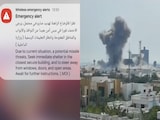The use of nuclear bombs in Hiroshima and Nagasaki is one of the most horrific incidents in history that killed hundreds of thousands of people and led to the surrender of Japan in the Second World War. But one man survived both the atom bombs dropped in Japan. According to history.com, Tsutomu Yamaguchi was preparing to leave Hiroshima when the first bomb fell. Yamaguchi, then 29, was a naval engineer who was on a three-month-long business trip and August 6, 1945 was his last day in the city.
At 8.15am, he was walking to his company's shipyard when he saw an American plane drop a small object connected to parachute. Suddenly, the sky erupted in blaze that he later described as "the lightening of a huge magnesium flare", as per the history.com report.
He jumped into a ditch but was sucked out of the ground by the shockwave that spun him into the air like a tornado and sent him hurtling into a field full of potatoes.
When he woke up, everything was dark and the blast had blotted out the morning sun. His face and forearms had been badly burnt and both his eardrums ruptured.
Yamaguchi got up and wandered around in darkness till he found some of his co-workers who had survived. They decided to go to the trains station, which they heard was somehow still operating. Yamaguchi was heading to Nagasaki, his home, not know what was to come.
Yamaguchi reached Nagasaki on August 8 and was treated at a local hospital. His wounds were so severe that his family members were not able to recognise him.
The next day, he reported to office and was asked to prepare a report on what happened in Hiroshima. His superiors were wondering how one bomb can wipe out an entire city, when the landscape outside suddenly exploded with another iridescent white flash.
Yamaguchi dropped to the ground just seconds before shockwaves shattered office window and sent pieces of glass flying in the air. His bandages were blown off and he was hit by another cancer-causing radiation. "I thought the mushroom cloud had followed me from Hiroshima," he later told The Independent.
In 2009, a year before his death, Yamaguchi told reporters, "My double radiation exposure is now an official government record. It can tell the younger generation the horrifying history of the atomic bombings even after I die."
He died in 2010, at the age of 93, after a battle with stomach cancer.















